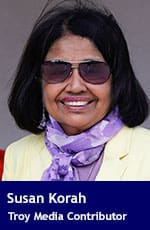Stranded travellers share stories of fear and frustration as the war in the Middle East escalates

For interview requests, click here
It’s a long way from Montreal to Yerevan, the capital of Armenia. So long that you may never get there because your plane might have to fly over some of the most dangerous airspaces in the world.
Having covered Middle Eastern and Armenian issues for years, I was acutely aware the carnage and mass displacement of people in Gaza, Israel and Lebanon were bound to spread outwards in a deadly ripple effect that could affect other nations and individuals not directly involved in the conflict.
Oct. 7, the anniversary of the first attack on Israel by Hamas, was also constantly hovering in my thoughts as news clips flashed the latest episodes of this catastrophic saga unfolding with mind-blowing speed.
Despite all of this, it was a shock when it was driven home to me in a personal way how the war in the Middle East could affect all of us – those who have families and personal connections in that part of the world but also those who merely see the region as somehow destined to be a permanent battle zone, far removed from the reality of our own lives.
 |
| Recommended |
| Saudi Arabia and Gulf allies caught in the crossfire of rising Israel-Iran tensions
|
| Israel demonized while Hezbollah war crimes ignored
|
| Why is only Israel wrong when it defends itself?
|
I was in the check-in line of Qatar Airways at Montreal’s Trudeau International Airport when the shock waves of violence spread outward without warning, throwing my travel plans and those of fellow Canadians into disarray.
I was on my way to speak in Yerevan at a high-profile conference on women, peace and security. Speakers on the agenda were such notables as Andrew Turner, recently appointed Canadian ambassador to Armenia, and Margot Wallstrom, former deputy prime minister of Sweden.
“Your flight to Yerevan is cancelled,” the Qatar Airways official told me. “So are flights to Shiraz, Tehran and all destinations in Iran.”
The reason? News had broken, half an hour before, that Iran had fired 200 missiles across its border at Israel.
I was initially in shock. Armenia is in the South Caucasus, at the crossroads between Europe and Asia. It is not involved in this particular military eruption, although it had its own troubles a year ago. Then I remembered Armenia shares a border with Iran. Flying through Iranian airspace would put the flight at risk of being struck by an Iranian missile, as happened only four years ago.
Other passengers waiting to check in for the same flight – Iranian Canadians who feared for the lives of their families in their home country – cried in anguish.
“I would rather die than not see my family again,” a young woman told me with tears in her eyes.
Some were furious at the airline for the cancellation. They were clearly emotionally overwrought and not thinking clearly. But that’s what happens to people when a war puts their loved ones in danger.
For me, this was a chilling reminder of 2020 when a Ukrainian Airlines flight from Tehran to Kyiv was shot down by Iranian missiles after hostilities escalated between Iran and the U.S. The tragedy followed an American drone strike that killed Qasem Soleimani, an Iranian general. All 176 people on board the Ukrainian plane, including several Canadians, were killed.
I had written about this horrific incident, so I checked the notes I compiled at the time. I found this heartbreaking detail written by Payam Akhavan, an Iranian Canadian lawyer, human rights activist and senior fellow at Massey College, University of Toronto.
“Amidst the twisted metal and clothing littering the scorched earth, there is a single red shoe of a child. It has a pretty bow, slightly singed by the flames that engulfed Flight PS752 in its last moments before it crashed from the sky in a great ball of fire, bringing to a sudden end so many stories yet to be told, so many joys yet to be discovered.”
I recovered from the shock of the flight cancellation announcement and was at peace within myself. The airline made the right decision when the Middle East appeared on the brink of an all-out war following the Israeli drone strike that killed Hezbollah leader Hassan Nasrallah. There seemed no end to the cycle of death and destruction.
The cancellation was God’s way of protecting me from danger. My friends in Canada and around the world, as well as the parish priest at the Syriac Orthodox Church in Ottawa, were praying for me, and I had prayed the whole way to the airport.
I turned around and returned to Ottawa, but not before I called the conference organizers and my friends in Yerevan waiting for me.
The tears and cries of frustration and helplessness of the Iranian Canadians will haunt me. War can not only destroy lives, homes and livelihoods but also break the hearts of those who live halfway across the world from the scenes of devastation.
My speech on women and humanitarian work in the midst of war and natural disasters will have to wait for another opportunity. But I gained a valuable insight from this experience. The global village is not a mere phrase but a space the whole human family shares. And we need to stand in solidarity and empathy with our neighbours in the village, engulfed in a web of despair and desperation, far worse than we – who have only known war vicariously through the news media – can imagine.
Let’s pray with St. Francis of Assisi and do whatever we can to sow love where there is hatred, hope where there is despair and light where there is darkness.
Susan Korah is Ottawa correspondent for The Catholic Register, a Troy Media Editorial Content Provider Partner.
Explore more on the Middle East, Iran, Terrorism, Israel, Armenia
The opinions expressed by our columnists and contributors are theirs alone and do not inherently or expressly reflect the views of our publication.
Troy Media
Troy Media is an editorial content provider to media outlets and its own hosted community news outlets across Canada.

